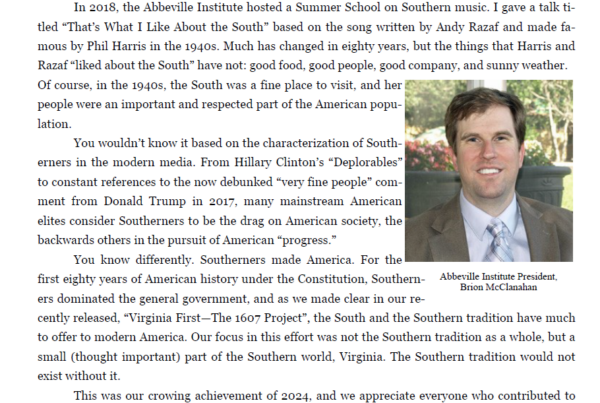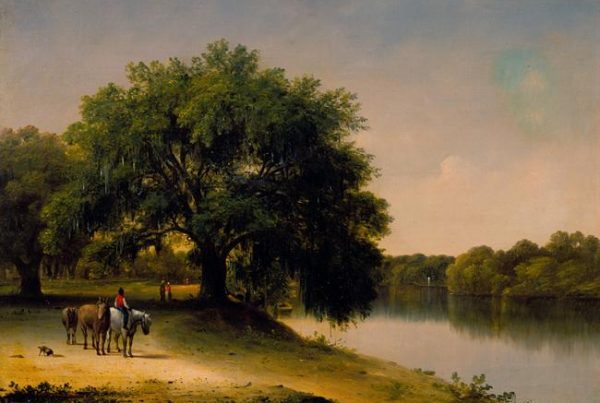
My new neighbor Ozzie, who grew up in the Bronx, thinks that the South is a place “without much culture.” Ozzie acts as if he is an expert on the subject, even though his Southern experience has been confined to living in the D.C. suburbs for a few years before retiring out here to the Blue Ridge Mountains last year.
(It should be noted that Ozzie’s real name is “Osgood”, but he is very sensitive about that fact being public knowledge. Don’t tell anybody…)
The other day I was having coffee out on the deck of Buster’s, our local eatery, with my buddy Copperhead Stephens. It was a beautiful autumn morning. At least it was until Ozzie came and sat down.
“You can’t find a decent place for good coffee around here,” he said. “Not like in Manhattan or Brooklyn. They just know how to make it better.”
“Mine’s good,” said Copperhead, without even looking up. “In fact, its very good. Its great! I can’t drink that slime they sell up North. Tastes like creosote.”
Ozzie is one of those guys who has no ear for humor. He takes everything seriously, which
Is a big handicap down South. “I’ve never had any that tasted like creosote,” he said. “In fact, what does creosote taste like?”
“Tastes a lot like Valvoline Motor Oil”, said Copperhead.
“Oh, well, I’ve never had any of that, either”, said Ozzie, with no hint of irony.
Copperhead is a big ol’ boy who looks like a biker that was raised by wolves. But looks can
be deceiving. He is actually a retired professor of philosophy. He is also a pretty fair 5 string banjo picker. And he has a chip on his shoulder about city folks who are condescending.
Ozzie took notice of the banjo case on the floor next to Copperhead.
“What’s in that thing?”, he asked.
“The remains of my first ex-wife,” said Copperhead, without smiling. It looked like Ozzie took him seriously.
“It’s a banjo,” I said. “Mr. Stephens is a musician.”
“Oh, I see. I guess you play that corny redneck twangy-twangy stuff, huh? You know, I have discovered that there really isn’t any good music anywhere South of say, Philadelphia. Certainly nothing with any sophistication,” Ozzie said, with an assured air of expertise.
Now, Copperhead is one of those ol’ boys that is so laid back that it is hard to tell if he is still breathing. But he did something that for him was hyper-active. He pulled his ballcap down a bit and squinted at Ozzie. Copperhead looked like Clint Eastwood right before he’d say, “Go ahead, make my day…”
He didn’t say anything but he opened the case, took out his old Deering, and started slowly tuning up. The banjo sparkled in the sun like a Cheerwine bottle-cap in a dusty red clay parking lot. Two couples moved over closer on the deck to where we were. They knew what was up.
Copperhead started sweet and low, playing a soft sweet version of Pachebel’s Canon. Each note was a statement of clarity, of purity. Ozzie looked as if he had been knocked in the head with a pipe wrench.
Copperhead then eased into a smoky, languid version of Errol Garner’s “Misty” and segued from there into Eric Clapton’s “Layla” before kicking it up with “Ramblin’ Man” by the Allman Brothers and somehow he went from there into a touch of Dvorak’s “New World Symphony”.
His fingers were typing a thousand notes a minute, but his expression never changed, just a slight, bemused grin.
By now, everyone in Buster’s had come out on the deck. Three cars and two pickups pulled in, attracted by the action. Copperhead laid out some really low down Lightnin’ Hopkins’ Texas blues and then kicked it back up with a rendition of “Foggy Mountain Breakdown” that was so fast it was clearly against the law. He played flamenco and Otis Redding, he played Ravi Shankar sitar riffs, and he played the Stars and Stripes Forever. More people had shown up, reached by way of their cell phones. And then Copperhead, seeing the assembled, who by then numbered maybe 50 folks, a rooster and several dogs, played the entire concert version of “Free Bird”.
This whole time he hadn’t said a word. He had played in every style and sound known to man, but had spoken not a word. Everybody went half-crazy begging for more.
But Copperhead placed his banjo back in its case, took a sip from a water bottle and began to speak.
“Y’all, I haven’t given a talk about anything since I left the University”, he mumbled. “But I feel the need to say something. I’m not up for talking about Socrates or ol’ Zeno, but I would like to share with you some thoughts about the myth of the Great Southern Gator-Man, who created American music back when there was no Big Bossman around anywhere near. Now, the Gator-Man was half man and half gator and he had huge red eyes and enormous teeth that shined like polished ivory. Now, on the darkest of the dark nights at a crossroads deep in the Big Dixie Swamp, the Gator-Man called a gathering. He sent out word for some specially chosen cats to come and meet him. And then here come these wildass fiddlin’ Scotsmen and Irishmen down from the Southern hills and some French dudes from New Orleans and lots of African folks from the Gullah and the Geechee Islands and from back in the bayous. And some Cherokees and Creeks and others of the ancient red tribes came drummin’ and dancin’, and then some of the Spanish cats found their way up the river and through the canebrakes.
“And when they had all gathered, the Great Southern Gator Man said, ‘Chirrun, I have had a vision:
‘Now, in this vision I seen people flockin’ and floodin’ in all around here to our Great South, and they see that its even better than Heaven….so they done started diggin’ in the ground and feedin’ pigs and huntin’ down them big ol’ bears and they was all doin’ o.k.,. I mean, you know they wusn’t goin’ hungry or nuthin’, but they just wasn’t a very joyful crowd of folks.”
“And why, brothers and sisters of this hot, muggy corner of Paradise, why are they unhappy? You ask why? Because they don’t know how to boogie woogie, that’s why!! And I know that you folks here tonight under the dark moon can get together and bring up from the bottom of your spirits the eternal and everlasting souls of all of your people from all of their days. And then we can liven this place up with some music, yeah, music from the bottom of your hearts..
Cmon’, y’all! Startin’ right here and right now! Let’s rock this swamp!”
Copperhead paused. The crowd around was hanging on his every word.
“And so, folks, now you know why all American music comes from the South. The Blues came from the South, and jazz came from the South, and rhythm and blues comes from the South, and Dixieland, and rock and roll, and rockabilly, and gospel music, and pop music and country music and bluegrass music and Tex-Mex music and Cajun music and Texas swing and Zydeco music, and even beach music! It is all Southern, y’all! Every bit of it! No doubt about it…”
The folks who had gathered around started to go off to earn their daily bread. Two little girls stared in awe at the banjo in the open case. “It’s a magic thing,” one told the other.
Several people made over Copperhead and his gift for music, but he could have cared less. “I’m just a picker,” he said.
As he was getting into his van, Ozzie got in his face. “What about polka?”, he demanded. “That’s not Southern!”
Copperhead didn’t miss a beat. “Comes from Southern Germany”, he said.
Copperhead closed the door of his van and started it up.
“What about rap music?” yelled Ozzie.
Copperhead smiled at that. “Well, rap does have Southern roots. But music’s gotta have two things, a beat and a melody,” he said. “Rap’s got a beat and that’s all. It ain’t really music. No melody… No melody.”
And then he pulled onto the two lane and headed off for some fishing.






